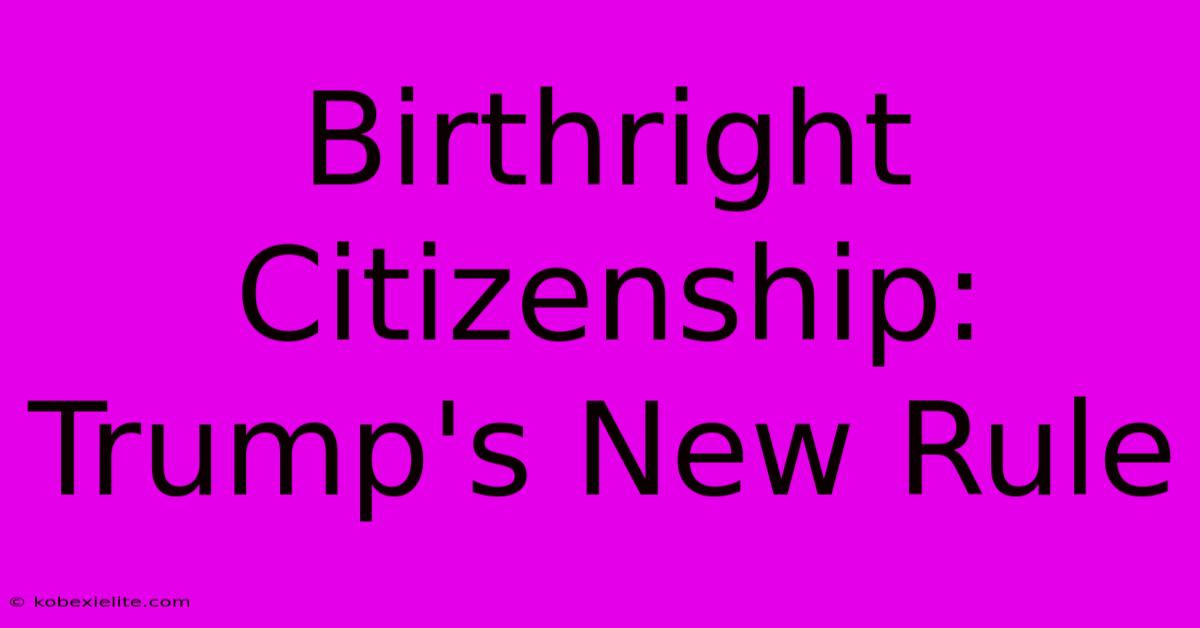Birthright Citizenship: Trump's New Rule

Discover more detailed and exciting information on our website. Click the link below to start your adventure: Visit Best Website mr.cleine.com. Don't miss out!
Table of Contents
Birthright Citizenship: Trump's Proposed Rule and the Ongoing Debate
The issue of birthright citizenship, enshrined in the 14th Amendment of the U.S. Constitution, has been a subject of intense political debate for decades. Recently, discussions have reignited, particularly surrounding former President Trump's proposed executive action to restrict it. This article delves into the complexities of this contentious topic, exploring the legal arguments, political implications, and potential consequences of altering the current system.
Understanding Birthright Citizenship: The 14th Amendment
The 14th Amendment, ratified in 1868, states: "All persons born or naturalized in the United States and subject to its jurisdiction, are citizens of the United States and of the State wherein they reside." This clause, often referred to as the jus soli principle (right of soil), grants citizenship to individuals born within U.S. borders, regardless of their parents' citizenship status. This has been the cornerstone of U.S. citizenship law for over 150 years.
Key Arguments Supporting Birthright Citizenship
Proponents of birthright citizenship argue that:
- It's enshrined in the Constitution: The 14th Amendment explicitly grants citizenship based on birth within U.S. territory. Altering this would require a constitutional amendment, a complex and politically challenging process.
- It promotes equality: Birthright citizenship ensures that all children born in the U.S. have equal rights and opportunities, regardless of their parents' immigration status.
- It simplifies administration: A system based on birth simplifies the process of determining citizenship, compared to a system that requires complex investigations into parental status.
- It aligns with international norms: Many countries around the world utilize jus soli as a basis for citizenship, reflecting a global understanding of the concept.
Trump's Proposed Executive Action: A Challenge to the Status Quo
During his presidency, Donald Trump repeatedly expressed his desire to end birthright citizenship through executive action. He argued that the 14th Amendment's "subject to its jurisdiction" clause allowed for exceptions, and that undocumented immigrants should not automatically confer citizenship on their children born in the U.S. This proposal faced significant legal challenges and widespread criticism.
Legal Challenges to Trump's Proposal
Legal experts widely criticized Trump's proposed executive action, arguing that it would be unconstitutional. The Supreme Court has consistently interpreted the 14th Amendment to grant birthright citizenship broadly. Overturning this precedent through executive action would likely be deemed unlawful and would face immediate legal challenges.
Political Ramifications and Public Opinion
Trump's proposal ignited a heated political debate, dividing public opinion along partisan lines. While some supported his efforts to restrict immigration, others viewed it as an attack on the Constitution and a violation of fundamental rights. The debate highlighted the deep divisions within American society regarding immigration policy and the interpretation of the Constitution.
The Ongoing Debate and Future Implications
The debate over birthright citizenship remains a central issue in American politics. While Trump's attempt to end it through executive action ultimately failed, the underlying tensions persist. Any significant change to the current system would necessitate a constitutional amendment, a process requiring broad political consensus and significant public support. This makes any immediate alterations highly unlikely. However, the ongoing discussion highlights the need for a thoughtful and comprehensive approach to immigration reform that addresses both the legal and societal dimensions of this complex issue. The future of birthright citizenship remains uncertain, subject to evolving political landscapes and ongoing judicial interpretations.
Keywords: Birthright citizenship, 14th Amendment, jus soli, Trump, executive action, immigration, constitutional law, citizenship, legal challenges, political debate, U.S. citizenship, undocumented immigrants, immigration policy, Supreme Court.

Thank you for visiting our website wich cover about Birthright Citizenship: Trump's New Rule. We hope the information provided has been useful to you. Feel free to contact us if you have any questions or need further assistance. See you next time and dont miss to bookmark.
Featured Posts
-
Unlikeable Character Leo Woodall
Jan 23, 2025
-
Real Madrid Welcomes Jacobo
Jan 23, 2025
-
Taskmaster 19 Meet The New Line Up
Jan 23, 2025
-
Celtic Wins 1 0 Vs Young Boys
Jan 23, 2025
-
Rancho Bernardo Fire Update Evacuations
Jan 23, 2025
